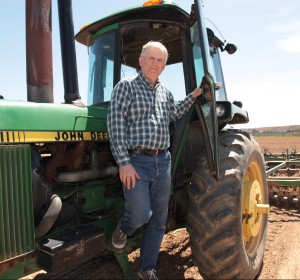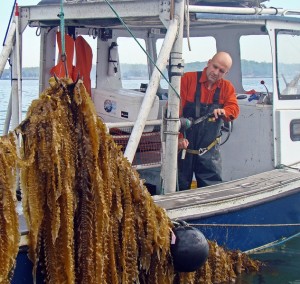Written for the Long Island Sound Study’s Fall 2014 Update, this pair of articles provides great examples of how farming–both on land and at sea–can help reduce hypoxia and improve the Sound’s water quality. Farmers and fishermen are some of the strongest environmental stewards; we’re thankful for those who have looked to adapt their practices to reduce their footprint. They are true leaders, showing us that what’s good for the planet can be great for business. Learn more about the Long Island Sound Study on its website, and click for the rest of their Fall update.
Growing Potatoes While Improving Water Quality
Scientists and resource managers know that slow or controlled-release nitrogen fertilizer can reduce the amount of nitrogen used on farms. But the product won’t be of much use unless farmers are convinced that it can be effectively applied on their local soils, in their growing conditions, and without negatively affecting yield. That is where Marty Sidor, a third-generation potato farmer on the North Fork of Long Island, has played a crucial role.
Marty was one of the first farmers to participate in a project started by the Agricultural Stewardship Program at Cornell Cooperative Extension of Suffolk County and the American Farmland Trust to show that the new fertilizer can work in the North Fork of Long Island, a region about 70 miles from New York City with an expanding population of commuters. Sidor and other “early adopters” helped pave the way for more than 25 commercial sweet corn and potato farmers to participate in the program in 2013. On average, farmers who have used the new fertilizer have reduced nitrogen applications by 20 percent, lessening the risk of nitrogen running off into Long Island Sound and leaching into the groundwater, which is Long Island’s sole drinking supply. “The more you are looking to produce, being on the Island and sitting over the groundwater aquifer, you have to be accountable for that,” said Sidor.
Sidor traces his environmental ethic to his grandparents, who understood that conservation was the key to managing a small family farm. But Marty also brings 21st-century ideas to both the business of farming and stewardship. For instance, Sidor has purchased an on-farm potato chip processing facility to create North Fork Potato Chips and to have a new market to sell his potatoes. The sunflower oil he uses in the chip-making process is repurposed as biofuel in his fleet of trucks, tractors, and other equipment.
Oyster Farmer Looks Toward Improving Water Quality
Research in Long Island Sound is showing that capturing nutrients by growing and harvesting native shellfish and seaweed is a viable way to improve water quality in an economically beneficial way. Brendan Smith, owner and operator of the Thimble Island Oyster Company in Branford, Connecticut, was looking for a way to diversify his aquaculture operation in a sustainable way. Working with Charles Yarish of the University of Connecticut, Smith starting growing sugar kelp (Saccharina latissima), a highly valued food source in Asian and health food markets and restaurants, as part of his oyster aquaculture operation.
This past year, Smith sold out to local restaurants the first commercial harvest of sugar kelp in Long Island Sound. The sugar kelp takes up nitrogen during the winter to grow, lessening the negative water quality impacts that occur in the summer. Because of his efforts, Smith was chosen in 2013 as one of six “Ocean Heroes” by Oceana and Future of Fish’s “Ocean Entrepreneur” of the year.
Both written by Robert Burg, Long Island Sound Study Communications Coordinator at New England Interstate Water Pollution Control Commission. Photos: Marty Sidor by Rory MacNich; Bren Smith by Ron Gautreau; cover by Judi.
